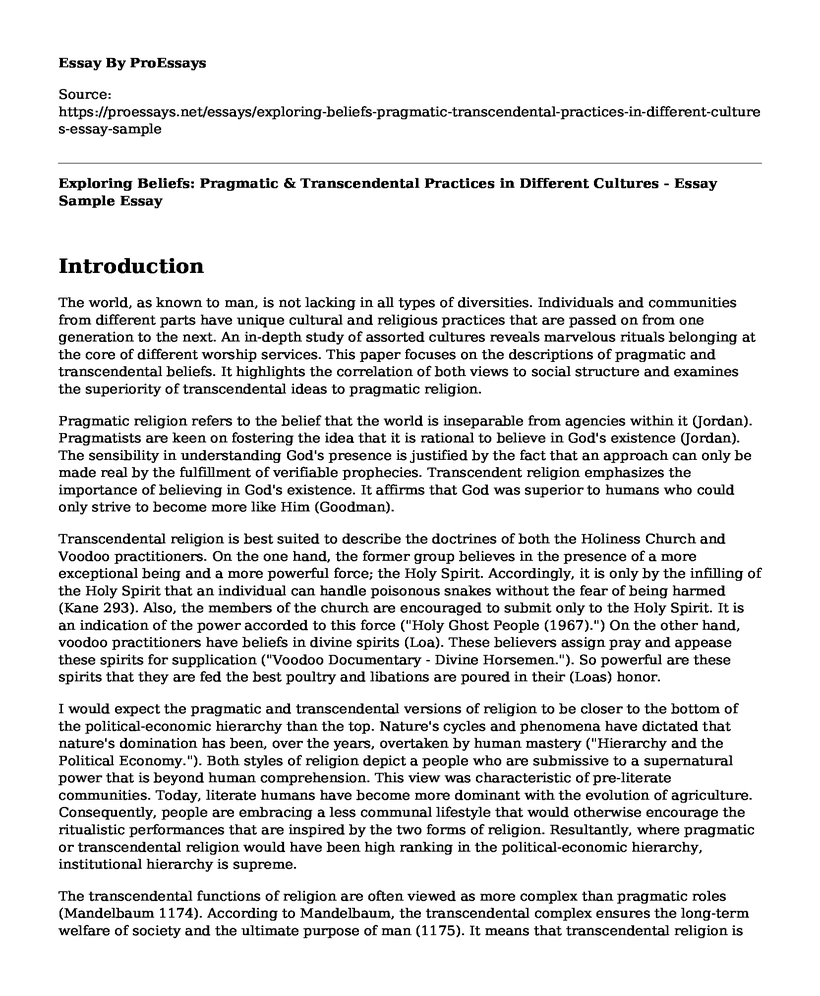Introduction
The world, as known to man, is not lacking in all types of diversities. Individuals and communities from different parts have unique cultural and religious practices that are passed on from one generation to the next. An in-depth study of assorted cultures reveals marvelous rituals belonging at the core of different worship services. This paper focuses on the descriptions of pragmatic and transcendental beliefs. It highlights the correlation of both views to social structure and examines the superiority of transcendental ideas to pragmatic religion.
Pragmatic religion refers to the belief that the world is inseparable from agencies within it (Jordan). Pragmatists are keen on fostering the idea that it is rational to believe in God's existence (Jordan). The sensibility in understanding God's presence is justified by the fact that an approach can only be made real by the fulfillment of verifiable prophecies. Transcendent religion emphasizes the importance of believing in God's existence. It affirms that God was superior to humans who could only strive to become more like Him (Goodman).
Transcendental religion is best suited to describe the doctrines of both the Holiness Church and Voodoo practitioners. On the one hand, the former group believes in the presence of a more exceptional being and a more powerful force; the Holy Spirit. Accordingly, it is only by the infilling of the Holy Spirit that an individual can handle poisonous snakes without the fear of being harmed (Kane 293). Also, the members of the church are encouraged to submit only to the Holy Spirit. It is an indication of the power accorded to this force ("Holy Ghost People (1967).") On the other hand, voodoo practitioners have beliefs in divine spirits (Loa). These believers assign pray and appease these spirits for supplication ("Voodoo Documentary - Divine Horsemen."). So powerful are these spirits that they are fed the best poultry and libations are poured in their (Loas) honor.
I would expect the pragmatic and transcendental versions of religion to be closer to the bottom of the political-economic hierarchy than the top. Nature's cycles and phenomena have dictated that nature's domination has been, over the years, overtaken by human mastery ("Hierarchy and the Political Economy."). Both styles of religion depict a people who are submissive to a supernatural power that is beyond human comprehension. This view was characteristic of pre-literate communities. Today, literate humans have become more dominant with the evolution of agriculture. Consequently, people are embracing a less communal lifestyle that would otherwise encourage the ritualistic performances that are inspired by the two forms of religion. Resultantly, where pragmatic or transcendental religion would have been high ranking in the political-economic hierarchy, institutional hierarchy is supreme.
The transcendental functions of religion are often viewed as more complex than pragmatic roles (Mandelbaum 1174). According to Mandelbaum, the transcendental complex ensures the long-term welfare of society and the ultimate purpose of man (1175). It means that transcendental religion is concerned with the personal development of a group of people and a community at large. Understandably, a community's need for success is considered more superior than its benefit as advocated by pragmatic religion (Mandelbaum 1175). The foci of pragmatic religion include local exigencies and individual welfare (Mandelbaum 1175). In this regard, the Hindu religion, for example, assigns less powerful deities to pragmatic functions while transcendental gods are thought to have a universal domain. These points of view, therefore, may compel those who practice transcendental forms to belittle pragmatists.
Works Cited
Goodman, Russell. "Transcendentalism." The Stanford Encyclopedia of Philosophy, Winter 2019 Edition, URL = <https://plato.stanford.edu/archives/win2019/entries/transcendentalism/>.
"Hierarchy and the Political Economy." Conway Hall, 11 Aug. 2015, https://conwayhall.org.uk/ethicalrecord/hierarchy-and-the-political-economy-2/
"Holy Ghost People (1967)." YouTube, uploaded by TX VP, 11 March 2016, www.youtube.com/watch?v=QZIa4kutkIM
Jordan, Jeff. "Pragmatic Arguments and Belief in God." The Stanford Encyclopedia of Philosophy, Spring 2018 Edition, URL = <https://plato.stanford.edu/archives/spr2018/entries/pragmatic-belief-god/>.
Kane, Steven M. "Ritual Possession in a Southern Appalachian Religious Sect." The Journal of American Folklore, 87.346 (1974): 293-302.
Mandelbaum, David G. "Transcendental and Pragmatic Aspects of Religion 1." American Anthropologist, 68.5 (1966): 1174-1191.
"Voodoo Documentary - Divine Horsemen." YouTube, uploaded by Voodoo Priest Man, 27 August 2016, www.youtube.com/watch?v=4Tla44ZDyZs
Cite this page
Exploring Beliefs: Pragmatic & Transcendental Practices in Different Cultures - Essay Sample. (2023, May 24). Retrieved from https://proessays.net/essays/exploring-beliefs-pragmatic-transcendental-practices-in-different-cultures-essay-sample
If you are the original author of this essay and no longer wish to have it published on the ProEssays website, please click below to request its removal:
- Compare and Contrast Essay Example: Diversity and LIS Education
- Is There Existence of God?
- Essay Sample on The Child Rearing Practices
- The Period of Islamic Spain and Renaissance Essay Example
- Research Paper on Celebrating Diversity in Little Havana: Miami's Cultural Center
- The Book of Amos: Ancient Prophecy & Posthumous Editing - Essay Sample
- Paper Sample on Increasing Cultural Diversity: Challenges & Opportunities for Healthcare Systems







